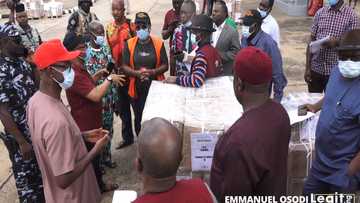Eligibility And All You Need to Secure an SME Grant From The Development Bank of Nigeria in 5 Easy Steps
- The Development Bank of Nigeria is offering grants to Micro, Small and Medium Enterprises to scale their operations
- 200 entrepreneurs in Nigeria will have the opportunity to receive training from the bank to scale their businesses
- According to the bank, eligible entrepreneurs will have the opportunity to have a face-to-face mentorship opportunity after which they get a grant to grow their businesses
A recent survey says Nigeria has about 39 million Micro, Small and Medium Enterprises (MSMEs) in Nigeria, with many needing capacity building and skills training, including grants to scale up.
The Development Bank of Nigeria (DBN) helps MSMEs with grants and loans or access to grants that allow them to scale up their operations for growth and effectiveness.

Source: Getty Images
200 businesses to benefit from face-to-face training
One of the top priorities of the bank is to enhance the capacity of entrepreneurs or business owners for them to formalise their operations, develop and become bankable and make them eligible for loans and grants.
PAY ATTENTION: Subscribe to Digital Talk newsletter to receive must-know business stories and succeed BIG!
The bank’s Learning Management System (LMS) is a free platform which has carefully developed and selected self-paced courses and will be used this year and accessible for Nigerians interested in re-skilling to grow in running their businesses in Nigeria.
This year, according to reports, the successful 200 businesses will be selected by the bank to take part in face-to-face mentorship in Lagos and Abuja.
The businesses will have the opportunity to talk to and receive support in some areas during these physical sessions, allowing them to use the fundamental principles in their respective businesses practically.
Participating businesses will be qualified to present their business value proposition, after which 14 participants will be chosen to receive the funding.
Criteria for participation
All applications must be submitted electronically via the application portal to participate in the face-to-face training.

Read also
Germany invites skilled Nigerian workers, others to apply for easy visa, similar to UK, Australia
Interested businesses must register on the DBN BizAid application and complete at least four mandatory courses on the BizAid Learning management platform with an average score of 70 per cent.
They must complete courses in Accounting and Booking, Sustainability for SMEs, Marketing and Sales Techniques, and Credit Management and Sales Techniques.
All four courses must be completed by September 23 and would be emailed a link with which to apply for the face-to-face training.
To become eligible, business owners must be 18 years and above, legal citizens of and resident in Nigeria, and have their businesses in Nigeria.
Additionally, the businesses must be based in Nigeria and come from any part of the country.
Selection criteria include bankability, feasibility and sustainability of the business model and scalability.
CBN gives N55.34 billion loan in May under 100 For 100 loan scheme, lists how to benefit
Legit.ng reported that Nigeria’s apex bank, the Central Bank of Nigeria (CBN) has paid out N55.34 billion under the 100 for 100 Policy on Production Productivity (PPP) scheme as of May 2022.
Data obtained from the CBN’s communique of the Monetary Policy Committee (MPC) held Monday, 23 May 2022 shows.
The scheme was launched on November 1, 2021, and will choose 100 private sector businesses with projects that have the ability to increase local productivity and Nigeria’s ability to earn the country's foreign exchange.
Source: Legit.ng



